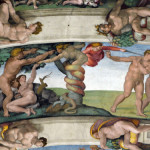We run our website the way we wished the whole internet worked: we provide high quality original content with no ads. We are funded solely by your direct support. Please consider supporting this project.
Predestination Part 2: Seeing Destiny Rightly
For Part 1, click here.
In Ephesians Paul teaches that God “chose us in [Christ] before the creation of the world to be holy and blameless in his sight” (Eph 1:4). In Christ, Paul continues, God “predestined us for adoption to sonship…to the praise of his glorious grace, which he has freely given us in the One he loves” – which, of course, is Christ (vs. 5-6). God made known to us “the mystery of his will” which he purposed in Christ (and that was hidden from the demonic realm throughout the ages, as discussed in chapter 3:8-9).
This plan was put into effect at the right time, and its goal was to “bring unity to all things in heaven and on earth under Christ” (vs. 10]. Paul then says again that we who are in Christ were “predestined according to the plan of him who works out everything in conformity with the purpose of his will” (vs. 11). And all of this, Paul says, was “to the praise of his glorious grace” (vs. 6, cf. vs.12).
Jesus represents the realization of God’s glorious dream for humanity. In Christ we see what we who are in Christ are destined to be. As a stick placed in a river is destined to be carried to whatever body of water the river runs to, so all who have allowed themselves to be drawn by the Spirit into Christ are destined to eventually look like Jesus (Rom. 8:28). When he appears at the end of the age, we shall see him as he truly is, John says, for we shall be like him (I Jn. 3:2).
This is why the New Testament speaks of Christ as “the firstbornamong many brothers and sisters.” A new family is being brought into being, and we shall all resemble Christ. This is also what Paul means when he refers to Jesus as “the first fruit” of those who now “sleep” (I Cor. 15:20). The “first fruit” in ancient Israel referred to fruit that was picked before the rest of the crop. These early pickings were, among other things, considered the guarantee that God would be faithful in bringing forth the rest of the crop. Jesus is “the first fruit” of a coming harvest that will look the same as him. Jesus reveals ahead of time the harvest of the humanity that God has always been dreaming of.
These insights add a new dimension to our understanding of what it means to say that Jesus was the Kingdom of God and why all who belong to the Kingdom, by definition, look like him. The entire creation project is centered on God’s dream of uniting himself with humanity as humanity co-rules with him on the earth. The whole creation is being steered toward a vision of a future in which everything will be harmoniously united under Christ, and thus become the dome in which God is King.
While individuals are free to align themselves with this divine vision or not, this glorious vision of humanity and creation becoming a radiant domain of God’s reign, dancing with and in the triune God, has been predestined from before the foundation of the world. It cannot fail to happen. And what we are now discovering is that Jesus incarnates this future in the present. He is the predestined man who embodies the predestined future (1 Pet 1:20).
Jesus manifests the future reign of God in the midst of the present reign of the Powers. He manifests the future union of God with humanity in the midst of a rebellious epoch in which God and humanity continue to be estranged from one another. He manifests humanity restored to their rightful place over the earth in the midst of a humanity that continues to be oppressed. He manifests humanity freed from sin and sickness in the midst of a humanity yet in bondage to sin and yet flogged by the devil with sickness.
So too, in the midst of a world that continues to be defined by oppressive Powers that incline us toward violence and hatred, Jesus reveals what humanity will look like when we’re exhaustively defined by God’s love. In the midst of a world where death continues to reign, Jesus’ resurrection reveals what humanity will be like when death has finally been overcome. In the midst of a world that continues to be oppressed by the ugly kingdom of Satan, Jesus reveals the beautiful Kingdom of God.
Category: General
Tags: Calvinism, Destiny, Free Will, Jesus, Open Theism, Predestination
Topics: Providence, Predestination and Free Will
Related Reading

Sinful Nature and Free Will
Q: If our sinful nature is what causes us to sin/reject God, can we be held responsible for our sins, when this nature resulted from Adam and Eve’s sin? Do we really have the freedom to either choose/reject God if our sinful nature compels us to reject God? On the other hand, if our sinful…

How can we determine what is and is not “open” about the future?
Question: You believe that the future is partly open. You’re writing has pretty much convinced me this is true, but I’ve still got some serious questions about it. For example, how does anyone determine what part is open and what part is not? If we can’t determine what is and is not open, isn’t the…

Is the open view the only view that is compatible with the Incarnation?
Question: You have said that the Open view of God is the only view that squares with the Incarnation and the only view that truly exalts God’s greatness. On what basis do you say this? Answer: The revelation of God in the Incarnation is the ultimate expression of God’s willingness and ability to change that…

Resisting Evil
The New Testament refers to Satan as the “god of this age” and the “ruler of the power of the air” (2 Cor 4:4; Eph.2:2). In the first century Jewish worldview, “air” referred to the domain of spiritual authority over the earth. The author, Paul, was thus saying that the spiritual environment of the earth…

What is the significance of Acts 27:10-44?
This is the passage deal with Paul’s ill-fated voyage to Italy as a prisoner. The ship ran into very bad weather and Paul announced, “Men, I can see that our voyage is going to be disastrous and bring great loss to ship and cargo, and to our own lives also” (vs. 10). As he reminded…

The Extremity of God’s Love
In response to questions he has received about whether Jesus was actually separated from the Father on the cross, Greg fleshes out his perspective on this. The love that unites the Trinity is the very same love that resulted in the separation of the Father from the Son. This separation actually expresses the great love…

